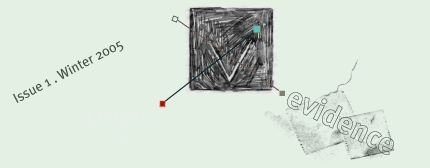For as long as we have been thinking about, designing, and programming this inaugural issue of Vectors, a war has been taking place half way around the world. Every day, that war is waged and information about it is disseminated using the very technologies that made conceiving this journal possible. How do we know what is really happening in that place? For those whose only exposure to the war is through streams of data mediated by screens like this one, it may be possible to suspect, as Jean Baudrillard famously declared some fifteen years ago, that none of it is really taking place at all.
For some time now, postmodern culture has comforted itself with the thought that our age is defined by unstable relations between signifier and signified; by delirious uncertainty not only about the past but our own access to events in the present. When words like evidence and reality begin to seem naked without quotation marks around them, it's hard not to wonder if we aren't simply playing into the hands of those who have the most to hide. With images of American soldiers torturing their captives fresh in our minds, those sanitized relays from smart missiles and satellites no longer hold the video game allure they once did. The creeping sense, articulated by Michael Moore, that "we are living in fictitious times" somehow no longer rings true. The times we are living in seem all too real and, against all expectations, the best evidence seems to lie in a few dozen grainy digital photographs e-mailed from the other side of the world.
In exploring the theme of Evidence, this issue of Vectors suggests that something of particular significance is at stake in our current relationship to the traces that are left behind by human actions. We invite you to explore the projects in this issue, each of which stages its own articulation of the meaning, nature and significance of evidence as a central element of scholarly practice. And we humbly dedicate this issue to those who have been killed by the ongoing violence in Iraq, whose numbers will never be known, whose remains may never be found, but whose traces should not be lost to history.
— Tara McPherson & Steve Anderson
|



